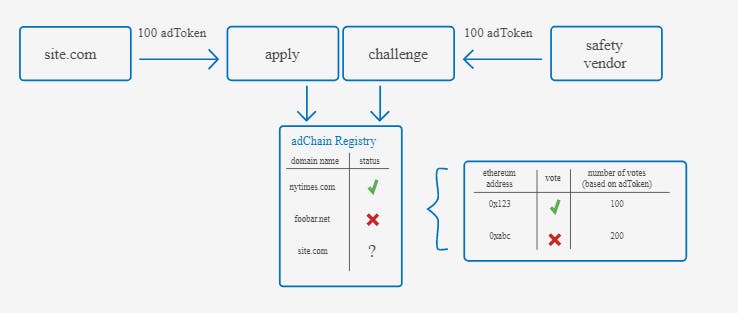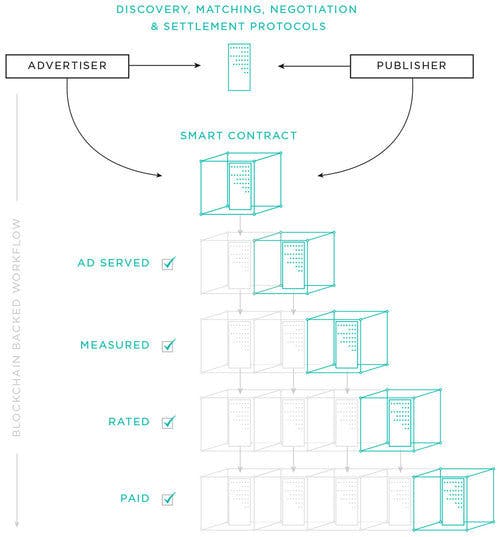One market in which blockchain tech is seen to have significant potential is the digital advertising industry. Here are four of the most interesting ways blockchain could be applied to digital advertising.
Data management
Data is the lifeblood of the digital advertising ecosystem. From measurement to targeting, players who acquire and put to good use data have a growing advantage over players who don’t.
Not surprisingly, some are looking at the ways blockchain tech can address issues and challenges related to data.
Comcast, for instance, last year announced that it is developing a Blockchain Insights Platform “aimed at improving the efficiency of premium video advertising, resulting in better planning, targeting, execution and measurement across screens.”
In a blog post, the cable giant explained:
One application of the Blockchain Insights Platform would be that advertisers and programmers could match data sets more effectively to build and execute media plans based on custom audience segments and more precisely and efficiently target across a nationwide footprint of pay-TV customers and streaming device users. Concurrently, programmers would be able to offer improved targeting precision across screens, increasing the value and quantity of monetized inventory. All participants would ultimately benefit from the resulting reporting and attribution metrics, and new potential revenue streams for participants could emerge for data insights they can generate for themselves and others.
Privacy is a huge data management issue and this is one area where Comcast believes the blockchain has the greatest potential to shine. All of the data offered by participants in the Blockchain Insights Platform would remain in their own systems and the blockchain would let “participants in the platform ask questions of each other’s data without having to access or take possession of anyone else’s data.”
Targeting and engagement
Advertisers and the ad platforms they work with have for years invested heavily in finding methods and acquiring data aimed at enabling them to deliver the right message to the right user at the right time, resulting in action.
Could the blockchain help them do this even more effectively? Some blockchain-based ad plays are betting it can.
Take BitClave, for example. It envisions a Consumer Activity Token that consumers earn by adding their data to the blockchain. When they perform searches through BitClave’s decentralized search engine, businesses that want to reach them will have to compensate them.
As BitClave’s founders see it, while internet giants do provide value through the free ad-supported services they offer, they shouldn’t be the only ones who reap the financial rewards gained from data provided by users. “Our decentralized search engine helps you truly find what you’re looking for and get compensated for your data, making third-party advertising networks unnecessary,” BitClave’s website tells prospective users.
China-based ATMChain, which describes itself as a “decentralized, digitized smart media platform”, is pursuing a similar approach under which users are compensated for viewing ads.
It’s important to note that both BitClave and ATMChain are works in progress and launched to the public via initial coin offerings (ICOs), which have become quite controversial due to fraud concerns. But while there’s no guarantee that either project will even materialize, both do highlight how blockchain tech could serve as the foundation for new targeting and engagement models.
Fraud prevention
Ad fraud is a multi billion-dollar problem that is understandably one of the top concerns among advertisers. Unfortunately, stamping it out is difficult because the digital ad ecosystem has become more complex and opaque, especially in recent years as use of programmatic increased rapidly.
The good news is that the industry is fighting back. Major ad vendors and publishers are getting behind the IAB standard Ads.txt, for instance. But Ads.txt isn’t perfect. Already, some are trying to trick publishers into adding them to their Ads.txt files, and Ads.txt doesn’t describe what type of inventory a particular seller is authorized to sell, opening up the possibility that a vendor could, for example, offer remnant display inventory for a publisher as premium video inventory.
While one company, MetaX, has opted to bring Ads.txt to the blockchain with an offering it calls Ads.txt Plus, others are aiming to create even more robust verification offerings using blockchain.
Take, for instance, adChain, “a set of interoperable open protocols built on the public Ethereum blockchain.” The first solution build on adChain is the adChain registry, “a smart contract on the Ethereum blockchain that maintains and stores a record of publisher domain names accredited as non-fraudulent.”

The accreditation is performed by holders of adToken, a blockchain token. The creators of adChain believe that the adChain registry will maintain a high level of integrity because these holders don’t have a financial interest in the ad transactions themselves.
Media buying and selling
Perhaps the most intriguing application of blockchain tech to digital advertising is to use the blockchain to enable publishers and advertisers to buy and sell ads with fewer intermediaries, or even directly.
One project that is aiming to make this application possible is called XCHNG. PaymentsSource’s Charles Manning recently explained how it is designed to work:
Through the use of blockchain technology, buyers and sellers outline their terms in a smart contract. The smart contract can be subjected to additional layers of verification and enforcement by optional service providers on the network, such as the measurement provider, ratings provider, payment provider and arbitrator.
The payment provider is responsible for releasing payments to publishers as contract terms are met. Additional incentives for payment providers include offering accelerated payment to publishers for a fee, which would in turn incentivize publishers to deliver.
Needless to say, the idea that blockchain-based smart contracts could effectively automate every aspect of the delivery of ads and the payments for them is very appealing.

But XCHNG and projects like it will all face a huge adoption challenge if and when they get off the ground. Put simply, the industry will have to embrace blockchain-based solutions en mass for them to be useful and there are plenty of players in the ecosystem, namely intermediaries, who largely don’t have incentives to go along.

Comments